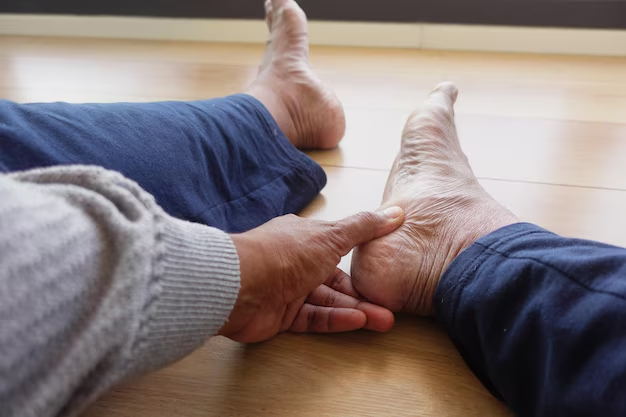Your Guide to Does Medicare Cover Ankle Surgery Recovery At Home
What You Get:
Free Guide
Free, helpful information about Medicare FAQ and related Does Medicare Cover Ankle Surgery Recovery At Home topics.
Helpful Information
Get clear and easy-to-understand details about Does Medicare Cover Ankle Surgery Recovery At Home topics and resources.
Personalized Offers
Answer a few optional questions to receive offers or information related to Medicare FAQ. The survey is optional and not required to access your free guide.
Curious About Medicare Coverage for Ankle Surgery Recovery at Home? Here’s What You Need to Know
Navigating the complexities of Medicare coverage can be daunting, especially when you're recovering from something as significant as ankle surgery. Understanding what is covered and where you might need additional support is crucial for a smooth recovery at home.
What Does Medicare Cover for Ankle Surgery Recovery at Home?
Medicare, particularly Medicare Part A and Part B, provides coverage for various aspects of medical care related to surgery, primarily focusing on hospital stays, doctor visits, and necessary medical supplies. However, when it comes to recovery at home, the situation can be slightly more complicated.
Medicare Part A: Covers inpatient hospital stays, care in a skilled nursing facility post-hospitalization, and some home health care under certain conditions.
Medicare Part B: Typically covers outpatient care, including doctor's visits, physical therapy, and some medical equipment necessary for home recovery, such as walkers or ankle braces.
Home Health Services: If you're planning to recover at home post-surgery, Medicare Part A and Part B may cover certain home health services, but it generally requires a doctor’s order and must be provided by a Medicare-approved agency. Professional services like part-time skilled nursing care or physical therapy might be covered if deemed medically necessary.
Despite this coverage, Medicare does not pay for 24-hour/day care at home, meals delivered to your home, or custodial or personal care unless part of the eligible home health services.
Exploring Additional Coverage Options
While Medicare covers significant portions of surgery and rehabilitation costs, out-of-pocket expenses can still occur. Here are some options you might consider:
Medicare Supplement (Medigap) Plans: These are designed to cover some additional costs not covered by Original Medicare, like copayments and deductibles.
Medicare Advantage Plans (Part C): These plans might provide broader coverage and additional benefits that Original Medicare doesn't, such as vision and dental, which can assist in overall health maintenance during recovery.
State Assistance Programs: Depending on your income and resources, you might qualify for Medicaid or other state assistance programs, which could help cover costs not included in Medicare.
Financial Aids and Support Beyond Medicare
Recovery is not just physical but financial too. Balancing between recuperating and managing bills can be tough. Here are some helpful financial avenues:
Government Aid Programs: These include Medicaid and Supplemental Security Income (SSI) for those who qualify based on income and need.
Community Assistance: Local community organizations and non-profits often offer assistance programs for those recovering from surgery or undergoing rehabilitation.
Debt Relief Options: Consider speaking to a financial advisor about exploring debt relief or restructuring options. Programs exist to help ease the burden of medical-related debt.
Credit Card Solutions: Some credit cards offer medical financing plans with low or no interest for a specific period, allowing for more manageable monthly payments.
In summary, while Medicare offers substantial aid for ankle surgery recovery, it may not cover every aspect, especially concerning home care. Exploring supplemental insurances, federal and state aid programs, and credit solutions can provide valuable support in managing both your health and your finances.
💼 Quick Reference: Financial & Support Resources Available
- Medicare Supplement Plans (Medigap)
- Medicare Advantage Plans (Part C)
- State Medicaid Programs
- Supplemental Security Income (SSI)
- Local Non-Profit and Community Assistance
- Debt Relief Counseling
- Medical Financing Credit Cards
Taking advantage of these resources can ease the stress of recovering at home and help you focus on what's truly important—your health and well-being.
What You Get:
Free Medicare FAQ Guide
Free, helpful information about Does Medicare Cover Ankle Surgery Recovery At Home and related resources.

Helpful Information
Get clear, easy-to-understand details about Does Medicare Cover Ankle Surgery Recovery At Home topics.

Optional Personalized Offers
Answer a few optional questions to see offers or information related to Medicare FAQ. Participation is not required to get your free guide.


Discover More
- a Medical Provider That Accepts Medicare Assignment Must
- a Medical Provider That Accepts Medicare Assignment Must Quizlet
- a Medicare Patient Received Treatment That Isn't Covered By Medicare
- a Medicare Patient Receives Treatment That Isn't Covered By Medicare
- a Medicare Supplement Basic Benefit Is Quizlet
- a Medicare Supplement Companies
- a Medicare Supplement Policy Is Quizlet
- a Medicare Supplement Policy Must Not Contain Benefits Which
- a Patient Received Treatment In August Medicare
- Am I Eligible For Medicare
